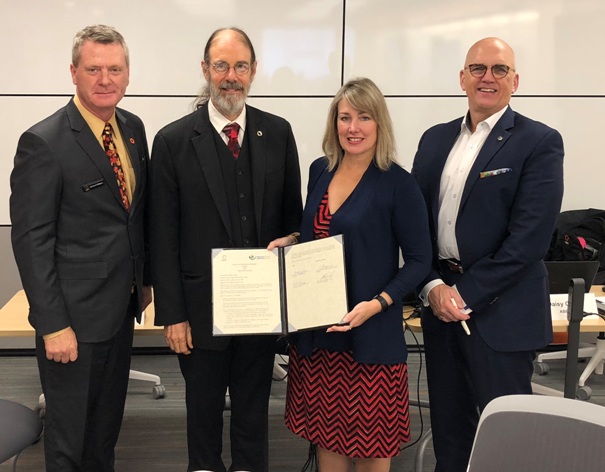
On November 2 and 3, 2018, Annette Bergeron, President Engineers Canada, and Gerard McDonald, CEO Engineers Canada were in Baltimore for the Accreditation Board for Engineering and Technology (ABET) Fall Governance Meetings.
 On November 2 and 3, 2018, Annette Bergeron, President Engineers Canada, and Gerard McDonald, CEO Engineers Canada were in Baltimore for the Accreditation Board for Engineering and Technology (ABET) Fall Governance Meetings. Their visit was focused on gaining a better understanding of the challenges and best practices surrounding ABET’s governance and accreditation activities. Engineers Canada was also in attendance to renew its mutual recognition agreement with ABET, which was updated to reflect changes to organizational titles, names, and dates.
On November 2 and 3, 2018, Annette Bergeron, President Engineers Canada, and Gerard McDonald, CEO Engineers Canada were in Baltimore for the Accreditation Board for Engineering and Technology (ABET) Fall Governance Meetings. Their visit was focused on gaining a better understanding of the challenges and best practices surrounding ABET’s governance and accreditation activities. Engineers Canada was also in attendance to renew its mutual recognition agreement with ABET, which was updated to reflect changes to organizational titles, names, and dates.
Given the size and complexity of ABET, it has had to organize its governance in such a manner that it can cope efficiently with numerous factors. To this end, the organization adopted a new governance structure in 2015, streamlining its Board of Directors from 60 to 13 and creating a second Board of Delegates to work on commission-specific accreditation issues. Bergeron and McDonald noted several key benefits to this substantial shift:
-
It has enabled a greater strategic focus by the Board of Directors.
-
It has placed decision-making responsibility for specific accreditation policies and practices more directly in the hands of the societies and individuals best informed about these issues.
-
It has allowed for better definitions of the knowledge, ability, and experience requirements for those holding different ABET leadership positions.
-
It has made decision-making nimbler and more responsive, particularly in reference to external relationships and shifts in the strategic environment.
In their meeting, the question of relationships was a key focus of the Board’s discussions, and particularly opportunities to expand ABET’s mandate through a more comprehensive accreditation scope and global outreach activities around accreditation such as memoranda of understanding, mutual-recognition agreements, assistance and training, recognition of substantial equivalency, and ABET accreditation of programs outside the United States.
Notably, Bergeron and McDonald were also invited to address the Board and respond to questions regarding the Engineers Canada 2019-2021 Strategic Plan and Engineers Canada’s diversity and inclusion strategies. Throughout the meeting, ABET directors were concerned with related questions of how to take more visible actions related to diversity and inclusion issues, and what ways harmonized criteria can be used in the spirit of continuous improvement to further ABET diversity and inclusion criteria.
On Friday evening, Bergeron and McDonald had the pleasure of attending the ABET Awards Gala, which celebrates the achievements of some of ABET’s most dedicated experts and individuals. Notably, the gala was organized in a way that encouraged free-flowing interactions among guests on either end of the one-hour presentation ceremony.

